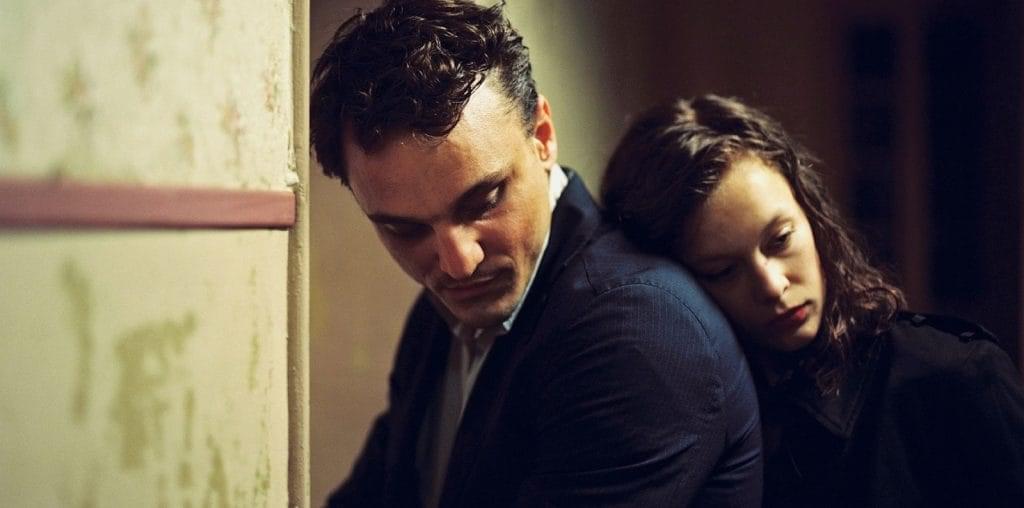
When San Francisco is invaded by “park them anywhere” scootie bikes, Silicon Valley technology “geniuses” run companies that literally lie about workplace endangerment, and black people get shot for being in their own backyards, I’m not sure if Boots Riley’s Sorry to Bother You is a cartoony version of our reality…or the other way around. Regardless, it invites you to mainline its condensed vision of all of these issues and more with blistering satire. Queue the Mr. ______ memes and essays aligning furry love with racial upheaval.
Sorry to Bother You follows Cassius “Cash” Green, a perpetually bent-over version of the lanky but charming LaKeith Stanfield that we’ve come to know and (hate)love over the last few years. Joined by his partner, daytime sign-spinner and indie artist Detroit (Tessa Thompson), Cash is broke as s**t living in his uncle’s Serge’s (Terry Crews) garage. Luckily, he gets a job at a telemarketing firm through a referral from a friend, Salvador (Jermaine Fowler). In a series of inventive scenes, we learn that Cash kinda sucks at selling people…just about anything.
At least, until a hilarious Danny Glover shows him how to put on “The Voice,” a white affectation that’s “what they wished they sounded like.” In embracing The Voice, Cash quickly moves up the ranks, gaining favor from his manager and fellow co-worker, Squeeze (Steven Yuen), who wants to unionize. Caught between the two factions, Cash chooses to go upstairs to become a “Power Caller,” which allows him to pay his uncle, but soon unveils a depraved world of marketing and advertising.
The drama surrounding Cash’s many sagas is the through-line of the film. The opening scene happens in his first manager’s office and some of its final scenes return us to its doors. Everything in between is a manic bounce in a multitude of directions, which isn’t a bad thing. Rather, Riley creates worlds within worlds in Sorry to Bother You, stretching the viewer’s understanding of the narrative reality while being incredibly incisive with where he chooses to put you in any given scene. For example, Cash’s skill at selling questionable things lands him at an exclusive Eyes Wide Shut-style party led by tech leader—and stand-in for everything supremely wrong with tech culture—Steve Lift (Armie Hammer.)

“…Danny Glover shows him how to put on ‘The Voice,’ a white affectation that’s ‘what they wished they sounded like.'”
It’s the dark side version of Burning Man (or at least, the Burning Man of yesteryear): incredibly rich well-to-dos engage in various forms of bacchanalia while sumptuous green, red and purple light casts hellish, vulgar hues on everything and everyone. In the middle of it all, Cash is increasingly disoriented and trying to find himself, and, his real voice. Or at least, he attempts to; his Voice (David Cross) is mandatory in this most intimate of rich, white spaces.
It’s a beautiful inversion of the same lighting used in an earlier scene where Cash discovers his affinity for his white voice. Set at a local bar. The Layover—Cash is surrounded by a group of friends while revelers and turfers fill the dance floor around them. The atmosphere is friendly and jovial. Here, the green, red and purple light works to embrace and support the seclusion—the respite—of this space.
This duality of mise-en-scene, or more accurately “what the f**k is actually going on in the background?” is something that Riley has a keen eye for. From ever-present homeless encampments to a hilarious sequence involving a copy machine, rhyme, reason and a bit of alternative sanity all play an important role in shaping Sorry to Bother You’s vision of Oakland. This shouldn’t be a surprise, however, given the film’s art direction is led by Kelsi Ephraim, whose experience on Swiss Army Man surely prepared her to balance seriousness, absurdity, and whimsy.
Sorry to Bother You is chock full of * that good heady stuff * to analyze, understand and critique. And for as much as the laudatory overflow for the film has amassed ahead of its public debut, I think that attention to critique, in particular, is needed. For at its best, Sorry to Bother You is a stoner-style-influenced odyssey of political awakening.

“…a stoner-style-influenced odyssey of political awakening.”
Its most absurd moments conjure up similar scenes from Fear and Loathing in Las Vegas, How High, Dude Where’s My Car, The Big Lebowski, and Half-Baked. With hijinks and high-flying absurdity, Riley is able to combine the bitter pills of well-worn activist woes—union-busting, homelessness, prison industrial complexes and capitalism-at-its-worst—with heart-warming ridiculousness like a “n***a moment” between Cash and Salvador turned into a hostile battle of pleasantries.
Whereas (mostly white) stoner comedies embrace the hijinks and absurdity (dare I say, also magical realism?) in the pursuit of las drogas, Sorry to Bother You simply uses them as a tool to further the cause of teaching lessons about oppression. This stylistic fusion forces us to come to grips with whatever given *message* Riley has in play, from the horrors of real life to just how bad the diminishing returns we cash in from mainstream society really are. In that sense, Sorry to Bother You reveals its genetic closeness to self-aware satires like Don’t Be A Menace and Idiocracy than the greater, established (white) dudebro, stoner canon.
That said, Sorry to Bother You also trips up on the same pitfalls that stoner comedies have become entrenched in over the years. Tessa Thompson and Lakeith Stanfield are surely beautiful, just….not together. Their lack of chemistry runs deeper than their opposing political ethos in the film and it shows the moment Detroit puts eyes on Squeeze. Both times I saw the film, I was left wanting by the lack of a more explicit love scene between the two. And, considering Detroit is a parody of scene-y, artsy manic pixie dream girl who’s still a functional manic pixie dream girl, Sorry to Bother You is weakened by not having more women represented in the film. Without her, it truly is just a film about men battling each other for attention, money and political growth.

“…combines the bitter pills of well-worn activist woes…with heart-warming ridiculousness…”
This point speaks to the ultimate dichotomy of Sorry to Bother You: at its heart, it is two films. One is a straightforward workplace comedy that speaks on the mundanity of low-wage office life, and the other is a political satire on race, wealth and politics. When Sorry to Bother Youflashes between both in a quantum cinematic space, it’s golden absurdist trillism.
Despite my griping here, I know this review will be one among what will likely be many to tackle these kinds of issues and the otherwise brilliant work at play in the film, and I look forward to the discourse. In particular, I’m interested in seeing how Kool-Aid drinking techies will react to seeing their cults of personality and CEO’s in searing technicolor. Considering Riley’s attention to detail, it’s no mistake the biggest villain—and his minions—in the film has an affinity for apples™, right? It’s one of the more subtle, “did you catch that?” moments that the film cashes in on at every turn that plays directly into the macabre parts of the film and more on-the-nose themes. Triple entendre, don’t even ask him how?
I’m digressing, I know.
The beauty of Sorry to Bother You is the juggling act. It balances direct, in-your-face Mel Brooksian satire with more hyperlocal, Oakland (and Bay Area) centric moments that reward various levels of well-worn cultural sommeliers. Of course, the juggle isn’t always perfect. But more often than not, it’s effective. Thus, Sorry to Bother You strikes at the heart of pie-in-the-sky tech-saviorism that’s often at the cost of real (black, brown, Asian, etc) human lives and asks: what’s the price we’re willing to pay to play nice with a violent, capitalist status quo. And why?

Sorry To Bother You (2018) Written and directed by Boot Riley. Starring Lakeith Stanfield, Tessa Thompson, Jermaine Fowler, Omari Hardwick, Terry Crews, Danny Glover, Armie Hammer.
8/10 orders with free shipping from Worry Free, LLC.


I loved “Sorry to Bother You.” I love all the satirical ground it covered, and the real-world scenario that this country has been running from for too long–actual, street-level conflict between labor and capital.
I think this review misses the forest for the trees, the visceral for the genre-detailing. This comment in the review especially irked me: “Both times I saw the film, I was left wanting by the lack of a more explicit love scene between the two.” WTF??? Do you know how close you come to qualifying as a target of a Boots Riley parody when you make a comment like that??? Wow…